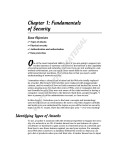Download Operator`s Handbook
Transcript
Pathfinder™ Scout Peripheral Printer Operator’s Handbook TC6021OH Rev. A 3/92 ©1992 Monarch Marking Systems, Inc. All rights reserved. Each product and program carries a respective written warranty, the only warranty on which the customer can rely. Monarch reserves the right to make changes in the product and the programs and their availability at any time and without notice. Although Monarch has made every effort to provide complete and accurate information in this manual, Monarch shall not be liable for any omissions or inaccuracies. Any update will be incorporated in a later edition of this manual. WARNING This equipment can interfere with radio communication if not installed and used in accordance with the instruction manual. It has been tested and found to comply with the limits for a Class A computing device pursuant to FCC Rules, Part 15, Subpart B, which provide reasonable protection against such interference when operated in a commercial environment. Operation in a residential area is likely to cause interference which the user must correct at their own expense. CANADIAN D.O.C. WARNING This digital apparatus does not exceed the Class A limits for radio noise emissions from digital apparatus set out in the Radio Interference Regulations of the Canadian Department of Communications. Le présent appareil numérique n’émet pas de bruits radioélectriques dépassant les limites applicables aux appareils numériques de la classe A prescrites dans le Réglement sur le brouillage radioélectrique édicte par le ministère des Communications du Canada. Trademarks MONARCH is a registered trademark of Monarch Marking Systems, Inc. Paxar is a trademark of Paxar Corporation 6010, 6021, 6090, 6092, 6094, 6095, 6096, and Pathfinder are trademarks of Monarch Marking Systems, Inc. - Preface This manual contains general information about: • the features and functions of the 6020™ Online Series printers. • the general operation of the printer. • the maintenance of the printer. Models such as the 6021-WP have offline printing capabilities. Refer to the Offline Features Manual for additional information. A Format Design Kit is available for information about designing format and label data records. The kit is used primarily by the specialist creating the formats and label data records. The kit contains the manuals listed below: • Programmer’s Manual • Format Reference i Operator’s Handbook Terms to know Programming specialist A programmer or individual with programming experience. The specialist will provide the operator format and label data records which will be sent to the printer. Host system Any mainframe, minicomputer, data terminal, or personal computer. download (send) Transmitting data from your host system to your printer. Offline printer Printer with offline printing capabilities. Cursor Tells which keypad mode you are in: Regular mode cursor is a solid underline. Shift mode cursor is a blinking rectangle. - Enter or enter Tells you to input data or information. - Represents the key on the keypad. Press this key to complete an action or to send data to memory. Format records Contains a specific label design for printing data. Label records The data containg the format number and the actual data to be printed on a label. = default ii = Represents the key on the keypad. Press this key to use the functions located on numeric keys. Refers to the value already set when you receive the printer. See Chapter 4, about the special operating functions. Preface How This Manual Is Organized Chapter 1 Gives a basic overview about your printer. Chapter 2 Tells you what you need to do and know before using the printer. Describes how to operate the printer to receive records and print labels. Chapter 3 It also describes data entry features available in your model. Chapter 4 Provides procedures for using special operating functions. Chapter 5 Provides information about the care maintenance of your printer. Chapter 6 Contains error messages you may see while using your printer and troubleshooting suggestions. Chapter 7 Provides specifications about your printer. It also has a listing of accessories you may use with your printer. Audience Operator is the individual printing and applying labels. Chapters 1, 2, 3, 5, 6, and 7 are for the Operator. Chapter 4 is for the supervisor setting the options of the printer. iii Operator’s Handbook iv Table of Contents 1. Overview..............................................................................1 2. Getting Started ...................................................................3 About the Handle...........................................................4 Charging Time ...................................................4 Low Battery........................................................5 Factors Affecting a Charge ...............................5 Charging the Handles....................................................6 Loading and Removing a Handle..................................7 Loading and Removing Supplies ..................................8 Loading Supplies ...............................................8 Removing Supplies .........................................12 The Display..................................................................13 The Cursor ......................................................13 Using Alphanumeric Mode ..........................................13 Using the Keypad ........................................................14 Using the Function Keys .............................................15 3. Printing a Label ...............................................................17 Receiving Records ......................................................18 Receiving Label Data Records........................19 Receiving Formats Records............................19 Error Messages ...............................................20 Duplicate Formats ...........................................20 Sequential Counting ....................................................21 Sequential Count Multiples..........................................22 Helpful Reminders.......................................................24 v Operator’s Handbook 4. Special Operating Features ............................................25 Setting the Communication Parameters ..................... 26 Date and Time Feature ...............................................27 Setting the Date and Time .............................. 27 Disabling/Enabling Date and Time Display..... 29 Changing Date and Time Styles ..................... 30 Date Format Samples .....................................33 Time Format Samples.....................................33 Displaying the Revision Level .....................................34 Sequential Count Multiples .........................................35 Online Interface ...........................................................36 Currency Selection......................................................37 Creating a Check Digit Routine...................................38 5. Care and Maintenance......................................................41 Clearing the Supply and Backing Paper Tracks ......... 41 Checking the Label Chute for Stuck Labels................ 43 Cleaning the Print Head and Platen Roller ................. 44 6. Messages and Troubleshooting......................................47 Messages....................................................................47 Error Messages...........................................................49 Troubleshooting ..........................................................50 7. Specifications and Accessories ......................................53 Specifications ..............................................................53 Accessories.................................................................53 vi 1. Overview If you requested custom formats for your printer at the time your printer was ordered, your printer already has formats stored in memory. If custom formats were ordered, see your management for procedures about using your formats. If you did not request custom formats, the programming specialist in your company must design formats to be sent to your printer. These formats must be sent to the printer’s memory before you begin to print labels. First, read Chapter 2 for general installation and operating procedures. 1 Operator’s Handbook 2 2. Getting Started It is important for you to read this chapter before you use the printer. In this chapter you will learn about: • charging the handles. • loading supplies. • the display. • using the keypad. • using the function keys. 3 Operator’s Handbook About the Handle The printer is powered by a NiCad battery pack in the handle (power module). A NiCad battery lasts approximately two years with average daily use. When you first receive the printer, you will need to fully charge the handle. You can charge the handle with a: • wall charger. ... or ... • power module charger. Refer to "Specifications and Accessories" for ordering information. Charging Time A full charge takes approximately 8 hours using the wall charger; approximately 1 1/2 hours using the 6094 Power Module Charger. Depending on which power charger you use, it can take 1-5 hours. CAUTION Always keep a handle attached to the printer. Storing the printer without a handle may erase or alter the memory. Make sure you charge the handles for the time recommended. 4 2. Getting Started Low Battery Anytime you store the printer, keep a handle attached to maintain the memory. However, you may need to recharge the handle before the printer can be operated. While you are using the printer, the printer beeps when the power is low, and displays a message: RECHARGE Turn the power off, switch to a fully charged handle, and recharge the used one. To ensure maximum print quality, switch to a fully charged handle for every roll of supply that is printed. Factors Affecting a Charge Here are a few factors which affect how long a charge will last. • The amount of information printed on each label. More energy is required to print a label with 10 fields than to print a label with 4 fields. • When the handle is not in use and is not recharging, the handle loses 2 - 3% of its charge per day. • Environments with extreme heat or cold will increase or decrease the discharge rate. During short term storage, you should keep the handle recharging. This way, the printer is ready for immediate use the next time you need it. 5 Operator’s Handbook Charging the Handles This procedure tells you how to charge the handle using the wall charger. WARNING Inspect the cord for bare wire before each use of the wall charger. Do not use the charger with bare wire. When using the wall charger or storing it: • Do not wrap the cord around the transformer. • Do not pull or put unusual stress on the cord. To recharge the handle while it is on the printer, push the power switch off. Do not use the printer while the handle is charging on the unit. Handle (Power Module) Figure 1 1. Plug the cord of the wall charger into the handle socket (Figure 1). 2. Plug the other end of the cord into a 115V electrical outlet. A full charge takes approximately 8 hours. The handle cannot be damaged by overcharging. Therefore, you can leave charged handle plugged in when not in use. Areas using 220V, 230V, or 240V will receive a wall charger designed for these voltages. 6 2. Getting Started Loading and Removing a Handle CAUTION If the power is on while removing the handle, this may erase or alter the memory. 1. Push the power switch off (Figure 2). Latch Power Switch Handle (Power Module ) Figure 2 2. Hold the latch down while you slide the handle to the rear and off the printer. 3. Slide a fully charged handle onto the printer until the latch clicks. 7 Operator’s Handbook Loading and Removing Supplies The following steps are for the initial loading and removing of supplies (labels). Loading Supplies Check your management to see what supply size you need for your printer. If you run out of supplies while printing, leave the power on and skip Step 7. 1. Squeeze the side tabs on the dust cover, and rotate it open until it locks (Figure 3). The hubs will retract in the locked position. Tear Here Hubs Dust Cover Side Tabs Figure 3 2. Remove the seal from the roll of supplies, and remove the first 10 tags or labels from the backing paper. Tear evenly across the backing paper. 8 2. Getting Started 3. Place the roll of supplies between the hubs. Rotate the dust cover forward slightly, so the hubs lock into the core of the roll. Make sure the supply turns freely on the hubs. 4. Hold the printer upright. In one quick release action, slide both latch buttons, one on each side of the printer, to the rear (Figure 4). The platen carrier will partially open. Metal Roller Guides Platen Carrier Latch Button Feed Label Strip Here Figure 4 5. Feed the label strip into the printer until it comes out the front and over the metal roller. 6. Close the dust cover completely. 9 Operator’s Handbook 7. Push the power switch on. The display shows a prompt. 5 If you don’t see the FORMAT? prompt, press and start the loading procedure from the prompt. 8. Press = 4 . The display shows: RELOADING 9. Pull the backing paper down between the guides and against the metal roller (Figure 5). 10. Pull the supply strip until it touches the bottom of the handle. Guides Trigger Feed Backing Paper Here Backing Paper Labels (Supplies) Figure 5 11. Press both sides of the platen carrier closed. 12. Separate the supplies from the backing paper. 10 2. Getting Started 13. Throw away the separated supplies and any supplies sticking to the backing paper. 14. Feed the backing paper into the slot between the roller and the loading chute. 15. Press the trigger until the backing paper exits the rear of the printer. If the backing paper is not straight, reposition it by applying light pressure to hold it in place while pressing the trigger. If the printer fails to feed the backing paper: ✓ Make sure the platen carrier is closed on both sides. ✓ Make sure the backing paper is threaded between the guides ...or... CAREFULLY pull the backing paper out of the slot. Tear evenly across the backing paper and repeat Steps 14 and 15. If the printer feeds the backing paper, but it does not exit: ✓ Make sure the backing paper isn’t wadded. Refer to Chapter 5, "Care and Maintenance." If the label partially exits, press the trigger a few more times. The printer will automatically adjust. If the supply doesn’t adjust, reload the supply. 16. Press 0 to exit. You’ll see SUPPLY? TYPE B Enter 1 for TYPE? A or enter 2 for TYPE? B1. Press You’ll see the FORMAT? prompt. 1 -. The supply type you enter can be found on the supply carton. 11 Operator’s Handbook Removing Supplies 1. Open the dust cover until it locks (Figure 6). 2. Tear evenly across the supply strip and remove the roll of supplies. 3. Push the power switch on. If you don’t see FORMAT? prompt, press you see the prompt. 5 until Power Switch Backing Paper Figure 6 4. Press = 4 . The display shows: RELOADING 5. Press the trigger to feed the backing paper out through the rear of the printer. 6. Press 0 to exit. You’ll see SUPPLY? TYPE B Enter 1 for TYPE? A or enter 2 for TYPE? B1. Press You’ll see the FORMAT? prompt. 1 -. The supply type you enter can be found on the supply carton. 12 2. Getting Started The Display Your printer has a 16-character one line display that shows prompts, a cursor, and data. The Cursor The shape of the cursor tells which mode you are in. • A solid underline shows when you are in regular mode. _ • A blinking rectangle (cursor) shows when you are in shift mode. You must be in shift mode to use the function keys. See "Using the Function Keys" for more information. [] • Two dashes shows when you are in alphanumeric mode. -- Using Alphanumeric Mode Alphanumeric mode uses two digit codes. The alphanumeric code chart is on the cover of your printer. Alphanumeric mode is used in Format 82, "Date and Time." See Chapter 4, "Special Operating Features" for more information. To use alphanumeric mode: 1. Press 3 to begin alphanumeric entry. 2. Enter the two digit code, for the two dashes, each letter you want. 3. Press 3 to exit alphanumeric mode. 13 Operator’s Handbook Using the Keypad The keypad consists of numbers and function keys. For online operations you will use the keys listed later in Table 1. Figure 7. The Keypad 14 2. Getting Started Using the Function Keys Function keys are used to access special features such as loading supplies. For example, • At the FORMAT? prompt, press =4 . You will see the message RELOADING and a blinking cursor indicating you are in shift mode. • After you load supplies, press the FORMAT? prompt. 0 , then - to return to Table 1. on the next page tells what action each function key does. = When you press , the printer stays in shift mode, as indicated by the blinking cursor, until the operation is complete. When the operation is complete, the printer will return to regular mode. 15 Operator’s Handbook Table 1. Function Keys for Online Usage = = 0 To use a function, press , then press the function key. For example, press , then press for the Clear function. 0 Function Key 4 5 = Description Special Operating Features... Erases data from the display as you answer prompts. At supply loading... Exits the loading function. Activates the supply loading function. Returns you to theFORMAT? prompt. Then you can enter a format number or select a special operating function. Places the printer in shift mode so you can use the function keys. These keys are also used for models with offline printing capabilities. See the Offline Features Manual for more information. 16 3. Printing a Label Before you can print a label, you must have formats in memory. To receive format and label data records, you must: • attach a fully charged handle. • set the communications parameters using Format 81. See "Special Operating Features" for instructions about Format 81. • connect a cable interface to the host system. See Chapter 7, "Specifications and Accessories" for a list of cables. The printer will automatically print a label once the data is sent to the printer. A programming specialist will provide the data records you need in the printer. The remainder of this chapter tells how to receive records from the host system. 17 Operator’s Handbook Receiving Records 5 To exit online anytime without destroying data, press until FORMAT? appears at the display. 1. Turn the printer on. 2. You’ll see a message indicating the printer is ready to receive records. WAITING If you don’t see the WAITING prompt:1 • Turn the printer off then on again to see the WAITING prompt. ...or... • Refer to Chapter 4, "Special Operating Features" for instructions on using Format 90 and setting up your printer to receive records. For instructions on receiving label data records, see "Receiving Label Data Records." For instructions on receiving format records, see "Receiving Format Records." 1 For models with offline printing capabilities, refer to the Offline Features manual about power up. 18 3. Printing a Label Receiving Label Data Records You can receive only one label data record at a time. The printer will not store label data records. You must have formats in your printer before printing a label. 1. At the WAITING prompt, send label data from the host system. 2. You’ll see NOT READY and then READY display as the printer processes your data. 3. A label will automatically print. You’ll see PRINTED: 1 5 4. You can continue to download data when you see PRINTED: 1, or press to exit and return to FORMAT?. See "Error Messages" if your printer detects errors. Receiving Formats Records You can send format records as often as you need. 1. At the WAITING prompt, send data from the host system. The printer will briefly display a message similar to the one below as the host system downloads records. RCVG FORMATS 2. You’ll see WAITING 3. You can continue to download data or press and return to FORMAT?. 5 to exit See "Error Messages" if your printer detects errors. 19 Operator’s Handbook Error Messages The printer detects record or communication errors and displays a message. Refer to Chapter 6, "Messages and Troubleshooting," for a listing of messages. Write down each message as you see it. Then hold down the 3 to clear the message. The WAITING prompt will appear. Report the errors to your programming specialist so that they may be corrected. The printer does not check label data records for errors until you try to print. If the printer detects errors, it displays them when you try to print the label. Duplicate Formats If your printer was shipped with custom fixed formats, any downloaded formats with the same format number will temporarily override the custom fixed formats. If you want to use the fixed formats, a clear command must be sent from the host system. Your programming specialist has instructions for clearing the buffer in the Programmer’s Manual. 20 3. Printing a Label Sequential Counting Sequential counting increases or decreases the count on a specific position or group of numbers within a field. This feature may or may not be used in your formats. When the end count is reached during printing, you will see *COUNT EXPIRED*. Press 3 and you’ll see PRINTED: 2 1 Press 5 and you’ll see WAITING 1 The number of labels printed depends on the value entered for END COUNT?** in the format. 21 Operator’s Handbook Sequential Count Multiples Sequential count multiples works with sequential count fields and prints multiple labels before incrementing or decrementing the count. Before you begin receiving records, which uses this feature, Format 86 must be enabled. See Chapter 4, "Special Operating Features" for instructions on using Format 86. The sample below gives you an idea of how this feature works: • In the format, sequential count position = 5 • In the label data record, END COUNT = 3 • In Format 86, MULTIPLES = 2 The peripheral printer will print two identical labels for each label data record as sequential count decreases to the number 3. Set 1 22 Set 2 Set 3 3. Printing a Label After the number in position 5 reaches 3, the printer stops printing and beeps, then displays *COUNT EXPIRED* 3 and you’ll see PRINTED: 6 Press 5 and you’ll see Press WAITING If a 0 (zero) is entered for MULTIPLES? in Format 86, you’ll see MULTIPLES? 0* You must enter a multiple label count and press before you can print. - 23 Operator’s Handbook Helpful Reminders • Always start with a fully charged handle. • Attach the safety strap of the printer to your wrist during operations. • Don’t pound the printer when applying labels to items. • For optimal print quality, Monarch recommends switching to a fully charged handle before loading a new roll of supply. • Push the power switch off when you are not using the printer. • Operate and store the printer within the recommended temperature ranges. Refer to Chapter 7, "Specifications and Accessories." • Charge the handles for the time recommended. When you are finished using the printer, always: ✓ Push the power switch off. ✓ Store the printer with the handle attached . ✓ Fully charge all handles. 24 4. Special Operating Features This chapter explains how to use the special features in your printer. The list below shows the feature name, format number, and password. Feature Name Format # Password 244 401 224 Changing Date/Time Styles: Enable/Disable Feature 80 Set Communication Parameters 81 Setting Date/Time Display 82 Revision Level 85 Sequential Count Multiples 86 2 00 Online Interface 90 None Currency Selection 91 None Check Digit Routine 93 None 500 When you first receive the printer... Feature Name Defaults Communication Parameter See "Setting the Communication Parameters" Date/Time display ENABLED Sequential Count Multiples DISABLED Currency U.S. CURRENCY 25 Operator’s Handbook Setting the Communication Parameters Format 81 allows you to review the current settings for each online option. Then you can accept the current values or change them. Check with your programming specialist for the values required by your host system. Prompt FORMAT? PASSWORD BAUD RATE? 9600 What You Do -. Press 4 , 0 and 1 . Enter 81, and press Enter a number and press 1 = 300 3 = 1200 5 = 4800 PARITY? SPACE XON/XOFF? DSABLE 2 = 600 4 = 2400 6 = 9600* Enter a number and press 1 = ODD 3 = MARK -. 2 = EVEN 4 = SPACE* Enter 1 or 2 and press 1 = DISABLE* 2 = ENABLE CNTRL CHR? NOPRN -. Enter 1 or 2 and press -. -. 1 = PRINTABLE 2 = NON PRINTABLE* FORMAT? * Default value 26 The online options are now set. See Format 90 to begin receiving label data records. 4. Special Operating Features Date and Time Feature The date and time feature allows you to set the internal clock and calendar in your printer. You can also change how the date or time displays and prints. The first thing you must do is set the internal clock with the current date and time. See "Setting the Date and Time." This lets you use date or time for printing if your formats contain these fields.1 If you need to change the styles for date or time see "Changing Date and Time Styles." Setting the Date and Time You must enter the date in month, day and year order (MM/DD/YY). Enter the time in military time (1345 for 1:45 PM). In both cases the punctuation is automatic. Prompt What You Do -. FORMAT? Enter 82 and press PASSWORD Press DATE: MM/DD/YY Enter 2 digits each for the month, day and year. Press . 2 2 4. - Example: 021491 and press 1 -. For models with offline printing capability, you can disable the display of this feature if you do not want to see DATE and TIME at power up. See "Disabling/Enabling Date and Time Display." 27 Operator’s Handbook DAY OF WEEK * - Enter 1-7 for the day of the week. Press . 1 = Monday 5 = Friday 2 = Tuesday 6 = Saturday 3 = Wednesday 7 = Sunday 4 = Thursday - Example: Enter 4 for Thursday and press . TIME: HH:MM - Enter 2 digits each for hours and minutes. Press . You’ll return to the FORMAT? prompt. - Example: Enter 0915 for 09:15 AM and press . 28 4. Special Operating Features Disabling/Enabling Date and Time Display This session is for models with offline printing capability. This feature lets you enable or disable date and time prompt display at power up. Disabling the date and time display will not affect the internal clock/calendar setting. Also, disabling the display will not interfere with printing the date/time fields on your label. Prompt What You Do Enter 80 and press FORMAT? 2 4 4. Press - . Press - . Press - . Press - . Press 8 to display D(disable) or 7 to display E(enable) and press - . Date and Time will not display Press PASSWORD DATE: MM/DD/YY TIME: HH:MM 24 HOUR? DISABLE AM/PM? ENABLE DISP ON PWRUP? -. E at power-up. You’ll return to the FORMAT? prompt. 29 Operator’s Handbook Changing Date and Time Styles When you first receive your printer, the default settings for displaying are: • MM/DD/YY for date. • HH:MM for time. • 24 hour clock (military time) is disabled. • AM/PM is enabled. • Display date and time at power up is enabled. You can change any of these settings as shown below. Prompt What You Do FORMAT? Enter 80 and press PASSWORD Press DATE: MM/DD/YY -. 2 4 4. Press = 0 to clear the current style. Now use the following alphanumeric codes to enter the new numeric date style. Press (Maximum of 16 characters.) -. 22 = M (month digits) 13 = D (day digits) 34 = Y (year digits) 40 = / (slash) -- optional 30 4. Special Operating Features Reminder.... =3 Example: Enter DDMMYY and press - to print 240191. To begin and end alphanumeric mode, you must press . If you want an alphanumeric style, see "Date Format Samples" and use the codes provided on the supply cover. =0 Press to clear the current style. Now use the following alphanumeric codes to enter the new style. Press . TIME: HH:MM **** - 17 = H (hours) 22 = M (minutes) 28 = S (seconds) 48 = : (colon) -- optional Reminder.... =3 Example: Enter HHMMSS and press - for 121436. Press 8 to enable military time style, or press - to skip to the next To begin and end alphanumeric mode, you must press . 24 HOUR? DISABLE prompt. When the 24 hour clock (military time) is enabled, the AM/PM feature is automatically disabled. 31 Operator’s Handbook 8 to disable AM/PM - to display the next Press or press prompt. AM/PM? ENABLE DISP ON PWRUP? E 8 - You’ll return to the FORMAT? prompt. 32 - Press to disable display of date and time at power up and press , ...or... press to keep unchanged. 4. Special Operating Features Date Format Samples The date samples below use Thursday, January 24, 1991. Date Style Displays MMDDYY or MM/DD/YY 012491 or 01/24/91 DDMMYY or DD/MM/YY 240191 or 24/01/91 YYDDMM or YY/DD/MM 912401 or 91/24/01 Alphanumeric Dates1... MAA.b DD,b YYYY JAN. 24, 1991 WAb MAAb DDb YYYY TH JAN 24 1991 Time Format Samples These time samples use 1:30 PM. Time Style Displays HHMMSS or HH:MM:SS 133026 or 13:30:26 (When military time is enabled.) 013026 or 01:30:26PM (When AM/PM is enabled.) HHMMSSb or HH:MM:SSb 013026 PM or 01:30:26 PM (When AM/PM is enabled.) __________________ 1 The letters M, D, Y, H, S, W and A are reserved letters. To spell out month, use M followed by A for each letter you want to display. To display day of week use W followed by A for each letter you want to display. b = blank space (use = 2 to produce spaces) 33 Operator’s Handbook Displaying the Revision Level This feature lets you see the revision level of your software. The first screen shows the kernel revision level; the second screen shows the date and time the software was updated. If you call Monarch Service with a problem, give them the information from both screens. Follow these steps to display the revision level. Prompt What You Do -. FORMAT? Enter 85 and press M6021 100712 This example shows that you have a 100712 kernel of 6021. Press to see the next screen. 5/29/91 This screen shows the date and time the software was updated. Press to see the custom ROM number assigned to your format set. 12:02: - - CUST #100000000 34 - Press to exit this function. You’ll return to the FORMAT? prompt. 4. Special Operating Features Sequential Count Multiples This feature is used for formats that include sequential count fields, and generates multiple labels before increasing/decreasing the count. For example, if you enable Format 86 to print multiples of 5, five labels will print before the sequential count increases or decreases. To enable sequential count multiples... Prompt What You Do -. FORMAT? Enter 86 and press PASSWORD Press MULT-DISABLE To enable the sequential count multiples, enter 2. MULT-ENABLE Press MULTIPLE?0 - 24 Enter a number from 0 - 24 for the number of multiples you want to print. Press . You’ll return to the FORMAT? prompt. 2 0 0. -. - To disable sequential count multiples... Prompt What You Do -. FORMAT? Enter 86 and press PASSWORD Press MULT-ENABLE Press 1 to disable sequential count multiples. Press . You’ll return to the FORMAT? prompt. 2 0 0. - 35 Operator’s Handbook Online Interface This feature lets you set your printer in receiving mode if you decide to download more formats and label data records. The printer is ready to receive records when you see the WAITING prompt. Reminder... Prompt Connect the printer to the host system with a cable interface. See Chapter 7, "Specification and Accessories" for more information. What You Do -. FORMAT? Enter 90 and press WAITING Send records from the host system. See "Receiving Records" for procedures about receiving format and label data record. 36 4. Special Operating Features Currency Selection This function lets you select a currency format for price fields or information fields. Prompt FORMAT? CURRENCY? What You Do -. Enter 1-12, then press - . Return Enter 91 and press to the FORMAT? prompt. Currency options are: 1 = DOLLAR 2 = DEUTCHMARK 3 = POUND 4 = KRONA 5 = FRANC 6 = MARKA 7 = SCHILLING 8 = LIRA 9 = PESETA 10 = NO SYMBOL (3 digits after decimal) 11 = YEN 12 = NO SYMBOL (2 digits after decimal) 37 Operator’s Handbook Creating a Check Digit Routine The printer lets you design your own check digit routine. You must define the check digit routine before entering a format that requires a customer check digit. Prompt What You Do -. FORMAT? Enter 93 and press PASSWORD Press RECORD #? Enter 1-10 for the record number of the check digit routine. Press . MODULUS 2-11? Enter any value 2-11 for the modulus number, press . 5 0 0. - - Example: DIGITS 2-15? - To select modulus 3, enter 3 and press . Enter any value 2-15 for the number of data characters in the field, excluding the check digit. Press . - Example: - For a 5-digit code, enter 5 and press . METHOD? Select 1 for sum of digits ...or... select 2 for sum of products. METHOD? S. DIGIT Press 1 and the 38 -. 4. Special Operating Features Prompt What You Do ENTER WEIGHTS** - Enter values 0-9 for the multiplier. Press . Example: - Enter 13131 and press . =5 To exit, press when you see the RECORD #? prompt. This saves your check digit routine and displays the FORMAT? prompt. 39 Operator’s Handbook 40 5. Care and Maintenance This chapter contains: • Clearing the Supply and Backing Paper Tracks • Checking the Label Chute for Stuck Labels (when using label supplies only) • Cleaning the Print Head and Platen Roller Clearing the Supply and Backing Paper Tracks 1. Push the power switch off. 2. Squeeze the tabs (Figure 8) on the dust cover and rotate it open until it locks. 3. Remove the roll of supply. Dust Cover Tabs Supply Holder Side Tabs Power Switch Figure 8 4. Squeeze the side tabs on the supply holder and rotate it open. 41 Operator’s Handbook 5. Check the supply and backing paper tracks (Figure 9). The motor may be hot. • If the backing paper is wadded, tear the backing paper. Carefully pull the wadded paper out through the front of the printer. Remove any labels stuck in the track. Reload the supplies. • If the backing paper is free, lift it and remove any labels stuck in the track. Label Track Backing Paper Track Figure 9 6. Close the supply holder and squeeze the side tabs to secure it. 42 5. Care and Maintenance Checking the Label Chute for Stuck Labels Hold the printer in an upright position. Slide the latch buttons (Figure 10) on each side of the printer to the rear with one quick release action. The platen carrier will partially open. 1. Slide the buttons to the rear again, the platen carrier will open completely. 2. Remove any stuck labels. Platen Carrier Label Chute Latch Buttons Figure 10 3. Press both sides of the platen carrier closed. 43 Operator’s Handbook Cleaning the Print Head and Platen Roller Clean the print head : After 7-10 rolls of standard supplies. ✓ In high temperature or humid conditions. ✓ When you see voids in the print (Figure 11). In excessively dirty environments or with heavy usage, clean the print head and supply holder more often. VOIDS CORRECT PRINT Figure 11 Monarch recommends using the Pathfinder 6076™ Cleaning Kit and reading the instructions before cleaning. 1. Remove the roll of supplies. Check the supply holder for adhesive buildup, and clean with isopropyl alcohol. 2. Slide both latch buttons (Figure 12) to the rear twice and release them to completely open the platen carrier. CAUTION DO NOT use sharp objects to remove adhesive or label particles from the green print head area. This may damage the print head and void your warranty. 3. Check the platen roller and carefully remove any stuck labels or adhesive buildup. 44 5. Care and Maintenance CAUTION Use isopropyl alcohol only on the interior areas, never on the exterior parts of the printer. DO NOT use silicon to clean or lubricate. 4. Lightly moisten a soft cloth with alcohol. 5. Clean the print head area (Figure 12) of all adhesive and label particles. 6. Also clean the platen roller and other surfaces that are shown. Special instructions are included in the 6076 Cleaning Kit. Platen Carrier Platen Roller Print Head Label Chute Latch Button Figure 12 7. Press both sides of the platen carrier closed. 45 Operator’s Handbook 46 6. Messages and Troubleshooting This section contains both informative and error type messages. If you cannot fix a problem, please contact Monarch Service. Messages To clear a message from the screen, press = 3. Message Corrective Action COMM ERROR Hold down the key until you see WAITING or FORMAT?. 3 The transmission of data was not successful. Check communication parameters set in the host system and the printer. Incorrect syntax in the format structure. DATA ERROR Transmission of label record not successful. COUNT EXPIRED The printer has reached the end count for sequential counting. Press to continue printing. Refer to Chapter 3, "Printing a Label" for more information. END COUNT? This prompt asks for the ending number of count. For information about sequential counting see Chapter 3, "Printing a Label". FORMAT UNDEFINED The format number you selected is not in memory. Retry, making sure the label data contains the correct format number. =3 47 Operator’s Handbook Messages (continued) Message Corrective Action OVERHEAT (when the power is first turned on) Ensure that you are operating or storing the printer within the recommended temperature listed in the specifications. Contact Monarch Service. OVERHEATED-WAIT (while printing labels) Let the printer cool for a few seconds. You don’t have to turn the printer off. When the printer is cool, the display shows PRINTED. You may begin printing. If the message still appears. Contact Monarch Service. PAPER JAM Press = 3 to clear the message. Check the label and backing paper tracks per the maintenance instructions. Reload the supplies if necessary. The label size set in the format does not match the supply you have loaded. Load the correct supply. RECHARGE Turn the power off and replace the handle with a fully charged handle. Recharge the used handle. SERVICE REQUIRED Contact Monarch Service. STRIP LENGTH? For offline printing models. Refer to the Offline Features. 48 6. Messages and Troubleshooting Error Messages 1. When you see one of the messages listed below, make note of the message. ERROR - FFD8 ERROR - FFE0 ERROR - FFEA ERROR - FFF0 ERROR - FFF6 ERROR - FFFC ERROR - FFDA ERROR - FFE8 ERROR - FFEC ERROR - FFF2 ERROR - FFF8 ERROR - FFDC ERROR - FFE2 ERROR - FFEE ERROR - FFF4 ERROR - FFFA 2. Turn the power off, then on. If the problem has not cleared, call Monarch Service. 49 Operator’s Handbook Troubleshooting If you cannot fix a problem, please contact Monarch Service. Problem Corrective Action No print on the supply. Make sure both sides of the platen carrier are closed. Make sure the supplies are loaded correctly. There may be an error in the format. Check with the programming specialist. Bad print or partial print on supply. Make sure the supplies are loaded correctly. Check the supplies for damage or defects. Reload new supplies if necessary. Check platen roller for stuck labels per maintenance instructions. Clean the print head. Turn the power off and switch to a fully charged handle. Make sure both sides of the platen carrier are closed. There may be an error in the format. Check with the programming specialist. Printer prints on part of the supply, and fails to respond to the keyboard or trigger. RECHARGE does not appear in the display. 50 Turn the power off and switch to a fully charged handle. Make sure the labels are loaded correctly. 6. Messages and Troubleshooting Problem Corrective Action Printer fails to respond to the keyboard, during data entry. RECHARGE does not appear in the display. Turn the power off and switch to a fully charged handle. Handle does not hold a charge, or the handle doesn’t fully charge when recharged. Generally, switch handles only when you see RECHARGE, or when there is no charge in the battery. Call Monarch Sales and Service. Printer will not feed. Turn the power off and switch to a fully charged handle. Make sure the platen cover is completely closed. Check for correct supply stock that is black marked. Reload the supplies. Check the label and backing paper tracks per instructions. Slow or sluggish supply feeding. Make sure the supplies are loaded correctly. Check the label and backing paper tracks per instructions. Handle won’t charge. Make sure the handle is connected correctly. Make sure the charger is plugged into a live outlet. Clean the printer per instructions. No display. Make sure the power switch is on. Turn the power off and switch to a fully charged handle. 51 Operator’s Handbook Problem Corrective Action Printer will not print. Turn the power off and switch to a fully charged handle. Make sure the supplies are loaded correctly. Print has voids or is too light. Make sure the supplies are loaded correctly. Make sure both sides of the platen carrier are closed. Turn the power off and switch to a fully charged handle. Clean the print head per maintenance instructions. Lock up occurs when you enter FORMAT 100-109 52 =3 Press to clear the display. Re-enter the correct format number. 7. Specifications and Accessories Specifications Weight: 1.98 lbs. (.89 kg) Storage and Operating Limits: 40˚F to 104˚F (4˚C to 43˚C) Battery Power: 12 volt; charging takes approximately 8 hours, 1 power module (handle) with a wall charger. - 6090 Charger takes approx. 5 hours. - 6094 Charger takes approx. 1 1/2 hours. Printing: Thermal direct with thermally coated paper (no ink or ribbon required) Display: 16-character (one line) alphanumeric liquid crystal display Memory: 3.6 volt lithium battery maintains memory Accessories • 6010 Table Top Accessory • 6090 Eight Station Charger • 6094 Four Station Charger • 6092-04 Wall Charger • 6095-02 AC Adaptor • 6096 Cable Interface • PHOL-01 Holster • TC6021FMKT Format Reference/Programmer’s Manual For more information about these products, call your Monarch Sales Representative. 53 Operator’s Handbook 54 Index A C Accessories 53 Alphanumeric 13 Alphanumeric mode 13 Charging battery 4, 6 Check digits creating a routine 38 Format 93 38 B password 38 Cleaning Backing paper platen roller 44 clearing 41 printhead 44 Battery Clearing backing paper 41 NiCad 4 Clearing supplies 41 Battery charge Communication Parameters factors affecting 5 baud rate 26 Battery handle 4 - 5, 7 control characters 26 charging 4, 6 parity 26 charging time 4 setting 26 loading 7 XON/XOFF 26 low 5 Control characters removing 7 communication parameters 26 Baud Rate communication parameters 26 Count expired 21 Currency selection Format 91 37 password 37 Cursor 13 Index-1 Operator’s Handbook D Date 27 disable 29 enable 29 password 27 sample 33 setting 27 style 30 Defaults special operating features 25 Display 13 Duplicate formats 20 E Error messages 20, 49 F Format 85 revision level 34 Format 86 sequential count multiples 22, 35 Format 90 receiving records 36 Format 91 currency selection 37 Format 93 check digits 38 Format records receiving 19 Function Keys using 15 H Handle loading 7 removing 7 Helpful Reminders 24 Index-2 K Keypad 14 L Label data records receiving 19 Labels loading 8 removing 12 stuck 43 M Maintenance 39 Messages 47 O Online Printing 18 Overview 1 P Parity communication parameters 26 Password check digits 38 currency selection 37 date and time 27 sequential count multiples 35 Passwords special operating features 25 Platen roller cleaning 44 Printhead cleaning 44 Printing 18 Index R Receiving records 18 Format 90 36 formats 19 label data 19 Revision Level display 34 Format 85 34 X XON/XOFF communication parameters 26 S Sample date and time 33 Sequential count multiples Format 86 22, 35 password 35 Sequential counting 21 Special Operating Features 25 defaults 25 passwords 25 Specifications 53 Stuck labels 43 Style date and time 30 Supplies loading 8 removing 12 Supply clearing 41 T Time 27 disable 29 enable 29 password 27 sample 33 setting 27 style 30 Troubleshooting 47, 50 Index-3 Operator’s Handbook Index-4 For supplies, service, or assistance in Switzerland call: Tel: 021 869 97 70 Fax: 021 869 96 02 e-mail: [email protected] Web: www.gomaro.ch Printed in U.S.A.





































































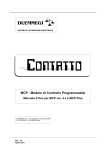
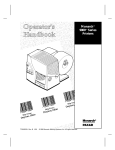

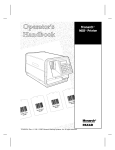
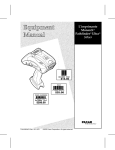

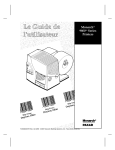
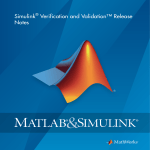
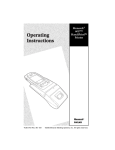
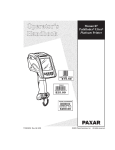
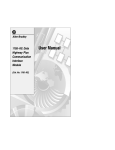

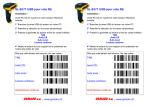
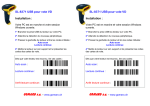
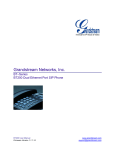
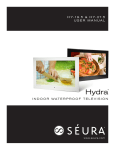
![MC92N0-G User Guide {English] (P/N 72E-162536-02](http://vs1.manualzilla.com/store/data/005752413_1-5c9790f7378b6b81af8236dfa051ab67-150x150.png)

